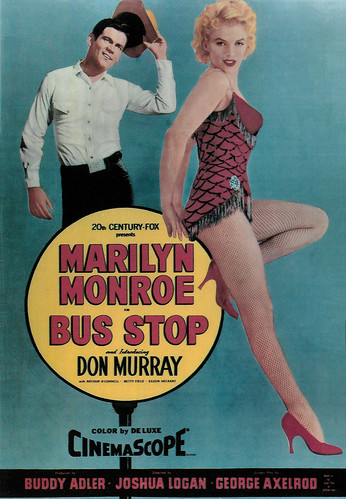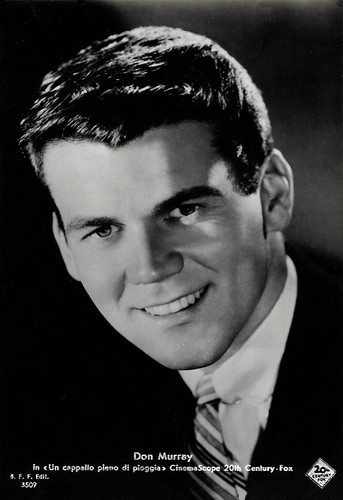
Spanish postcard by Raker, no. 1050.

American postcard by Classico San Francisco, no. 110-006. Image: 20th Century Fox. American poster of Bus Stop (Joshua Logan, 1956) with Marilyn Monroe and Don Murray.

Spanish postcard by Archivo Bermejo, no. 7317. Photo: 20th Century Fox. Don Murray in A Hatful of Rain (Fred Zinnemann, 1957).
A naive, overly enthusiastic, and socially inept cowboy from Montana
Donald Patrick Murray was born in 1929 in Hollywood, California, to Dennis Aloisius Murray and his wife Ethel Murray née Cook. Dennis worked as a dance director and stage manager, while Ethel was a singer who had performed in the Ziegfeld Follies on Broadway. Don attended the East Rockaway High School in East Rockaway, a village in Nassau County, New York.
During his high school years, Murray served as a member of the school's football team, its track team, and its glee club. He graduated in 1947, at the age of 18. He later attended the American Academy of Dramatic Arts in Manhattan, New York where he graduated in 1951. Murray made his Broadway debut as Jack Hunter in 'The Rose Tattoo' (1951) by Tennessee Williams. In the play, Hunter is a sailor and the boyfriend of Rosa Delle Rose, the daughter of the play's female protagonist.
Murray's stage career was interrupted when he was drafted into the United States military. He registered as a conscientious objector during the Korean War (1950-1953), as he was a member of the Brethren Church, an Anabaptist Christian denomination, which strictly adheres to pacifism and non-violence. Murray was assigned to an alternative service in Europe. He was honourably discharged from the military in 1954 and resumed his acting career. He starred alongside Mary Martin in the stage version of 'The Skin of Our Teeth'.
Upon seeing his performance in the play, director Joshua Logan decided to cast him in 20th Century Fox's film adaptation of 'Bus Stop', a play by William Inge. Murray made his film debut opposite Marilyn Monroe in Bus Stop (Joshua Logan, 1956), as Beauregard "Beau" Decker, a naive, overly enthusiastic, and socially inept cowboy from Montana. The film depicts Beau's infatuation with young singer Cherie (Monroe), which causes him to first kidnap her and then coerce her into marrying him. He is tragically unaware that Cherie barely knows him, and that his love is unrequited. The film was a box office success, and Murray was nominated for an Academy Award for Best Supporting Actor. The Award for that year was won by Anthony Quinn, but Murray's successful debut led to more film roles.
He was cast as Charlie Samson in the drama The Bachelor Party (Delbert Mann, 1957) as a hard-working bookkeeper who struggles with the temptation to cheat on his wife. He was then cast as morphine-addict Johnny Pope in A Hatful of Rain (Fred Zinnemann, 1957), a film about the then-innovative topic of drug addiction. In 1958, Murray played in his first Western, From Hell to Texas (Henry Hathaway, 1958). He was cast as Tod Lohman, an impoverished ranch hand who is suspected of murdering the son of a powerful cattle baron. The film deals with Lohman being hunted by the cattle baron's other son and his mercenaries, who seek revenge. Murray's second Western was These Thousand Hills (Richard Fleischer, 1959), a rags-to-riches story about a man who betrays his lover and alienates his only friend to marry a banker's daughter for her money. Murray was also cast opposite James Cagney in a lead role in the war film Shake Hands with the Devil (Michael Anderson, 1959), which depicts the Irish War of Independence.

American postcard by Classico San Francisco, no. 105-018. Photo: 20th Century Fox. Don Murray and Marilyn Monroe in Bus Stop (Joshua Logan, 1956).

American postcard by Classico San Francisco, no. 105-019. Photo: 20th Century Fox. Marilyn Monroe, Don Murray and Arthur O'Connell in Bus Stop (Joshua Logan, 1956).

American postcard by Classico San Francisco, no. 105-022. Photo: 20th Century Fox. Marilyn Monroe and Don Murray in Bus Stop (Joshua Logan, 1956).

American postcard by Classico San Francisco, no. 105-023. Photo: 20th Century Fox. Arthur O'Connell, Eileen Heckart, Marilyn Monroe and Don Murray in Bus Stop (Joshua Logan, 1956).
A human civilisation using apes as a slave force
During the 1960s, Don Murray continued to appear regularly in films, often cast in period dramas. Murray starred as a blackmailed United States senator in Advise & Consent (Otto Preminger, 1962), a film version of a Pulitzer Prize-winning novel by Allen Drury. Murray starred opposite Henry Fonda and Charles Laughton. He also co-starred with Lee Remick and Steve McQueen in Baby the Rain Must Fall (Robert Mulligan, 1965). He played Wild Bill Hickok in The Plainsman (David Lowell Rich, 1966), and ambitious ruler Justinian in The Viking Queen (Don Chaffey, 1967).
In 1968, Murray gained a co-starring role in the Western television series The Outcasts (1968-1969). He played Earl Corey, an American Civil War veteran and formerly wealthy slave owner. In the series, Corey was cheated out of his wealth by a treasonous brother and started making a living as a bounty hunter. He teams up with fellow bounty hunter Jemal David (Otis Young), an African-American freedman. The two men are not friends, but they are both social outcasts and need each other's skills to gain a profit. The series was considered groundbreaking for featuring an interracial team of characters but was criticised for being overly violent. The series lasted only 26 episodes.
In 1972, Murray played Governor Breck in Conquest of the Planet of the Apes (J. Lee Thompson, 1972). Breck is the authoritarian ruler of a human civilisation using apes as a slave force, and he is the owner of the film's heroic protagonist Caesar. He eventually fails to defeat a slave revolt and gets captured alive by his slave. The film was a box-office success. Murray was offered the role of Breck in the sequel, Battle for the Planet of the Apes (J. Lee Thompson, 1973), but he refused to return. He reportedly felt that there was no fun in playing the tyrant twice. In 1975, Murray starred in the thriller Deadly Hero (Ivan Nady, 1975), as the villainous protagonist Officer Lacy.
In the late 1970s, Murray mostly appeared in television films. In 1979, he made a comeback as Sid Fairgate in the soap opera Knots Landing (1979-1993). Fairgate was depicted as the owner of the used car dealership Knots Landing Motors, and pater familias to a large family. Murray played this role until 1981 when he left the series due to a salary dispute. His character was written out as having died during surgery. During the 1980s, Murray had a few film appearances in Endless Love (Franco Zeffirelli, 1981) starring Brooke Shields, Peggy Sue Got Married (Francis Ford Coppola, 1986) with Kathleen Turner, and the fantasy Made in Heaven (Alan Rudolph, 1987). In 1989, Murray gained a new co-starring role in the comedy-drama television series Brand New Life (1989-1990), playing the character of wealthy lawyer Roger Gibbons. The series was not successful, and only a pilot and 5 regular episodes were ever broadcast.
For the rest of the 1990s, Murray had guest star roles in various television series and appeared in a handful of television films. He directed and starred in the comedy Elvis is Alive (Don Murray, 2001). In 2001, the then 72-year-old Murray retired, but he returned to acting in 2017 when offered the recurring role of insurance company executive Bushnell Mullins in the third season of the mystery series Twin Peaks (1990-1991, 2017). Mullins was the boss of insurance agent Douglas "Dougie" Jones, one of several doppelgangers to FBI agent Dale Cooper, the series' main protagonist. The season was critically praised but there were no plans for a fourth season. His final film was the Western Promise (Joe Cornet, 2021). Don Murray passed away in 2024 at his home in Goleta, California, at the age of 94. He was married twice. His first wife was actress Hope Lange (1956-1962) with whom he had two children, Christopher and Patricia. In 1962, he married Bettie Johnson with whom he had three children, Colleen, Sean, and Michael.

American postcard by Classico San Francisco, no. 105-024. Photo: 20th Century Fox. Marilyn Monroe, Don Murray and Robert Bray in Bus Stop (Joshua Logan, 1956).

American postcard by Classico San Francisco, no. 105-025. Photo: 20th Century Fox. Don Murray and Marilyn Monroe in Bus Stop (Joshua Logan, 1956).

Italian postcard by Casa Editr. Ballerini & Fratini, Firenze, no. 3509. Photo: 20th Century Fox. Don Murray in A Hatful of Rain (Fred Zinnemann, 1957).
Sources: Dimos I (IMDb), Wikipedia and IMDb.
No comments:
Post a Comment